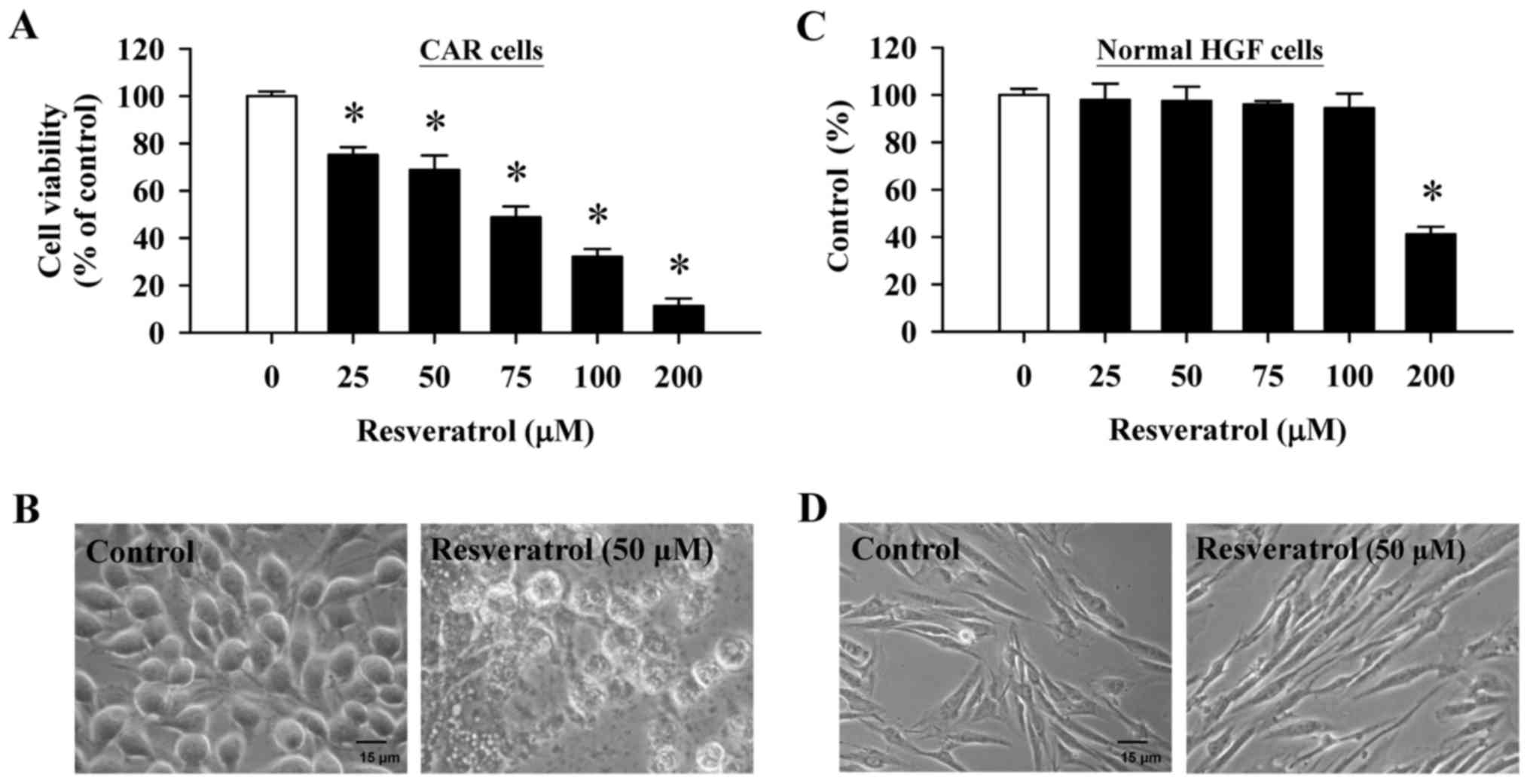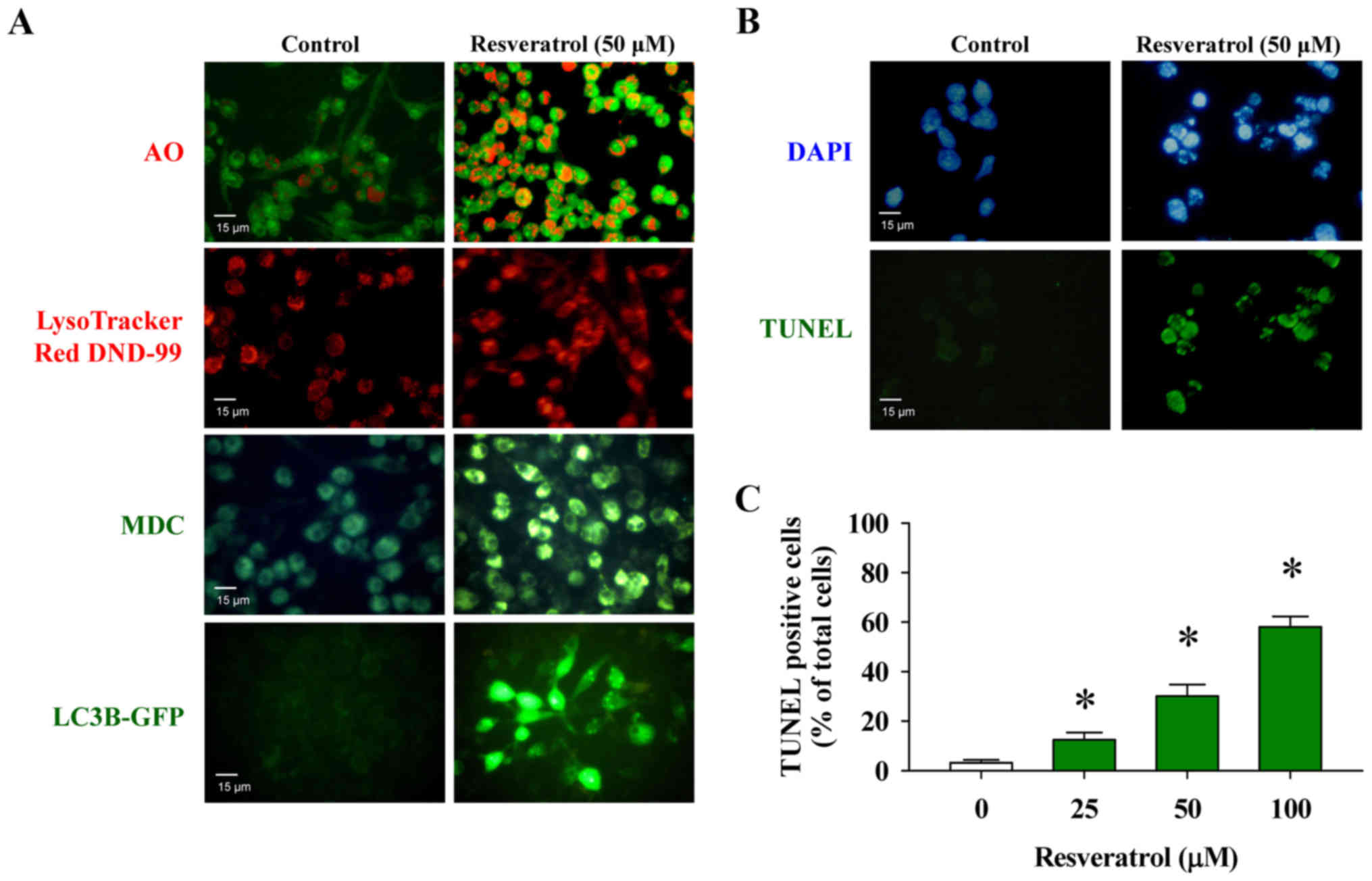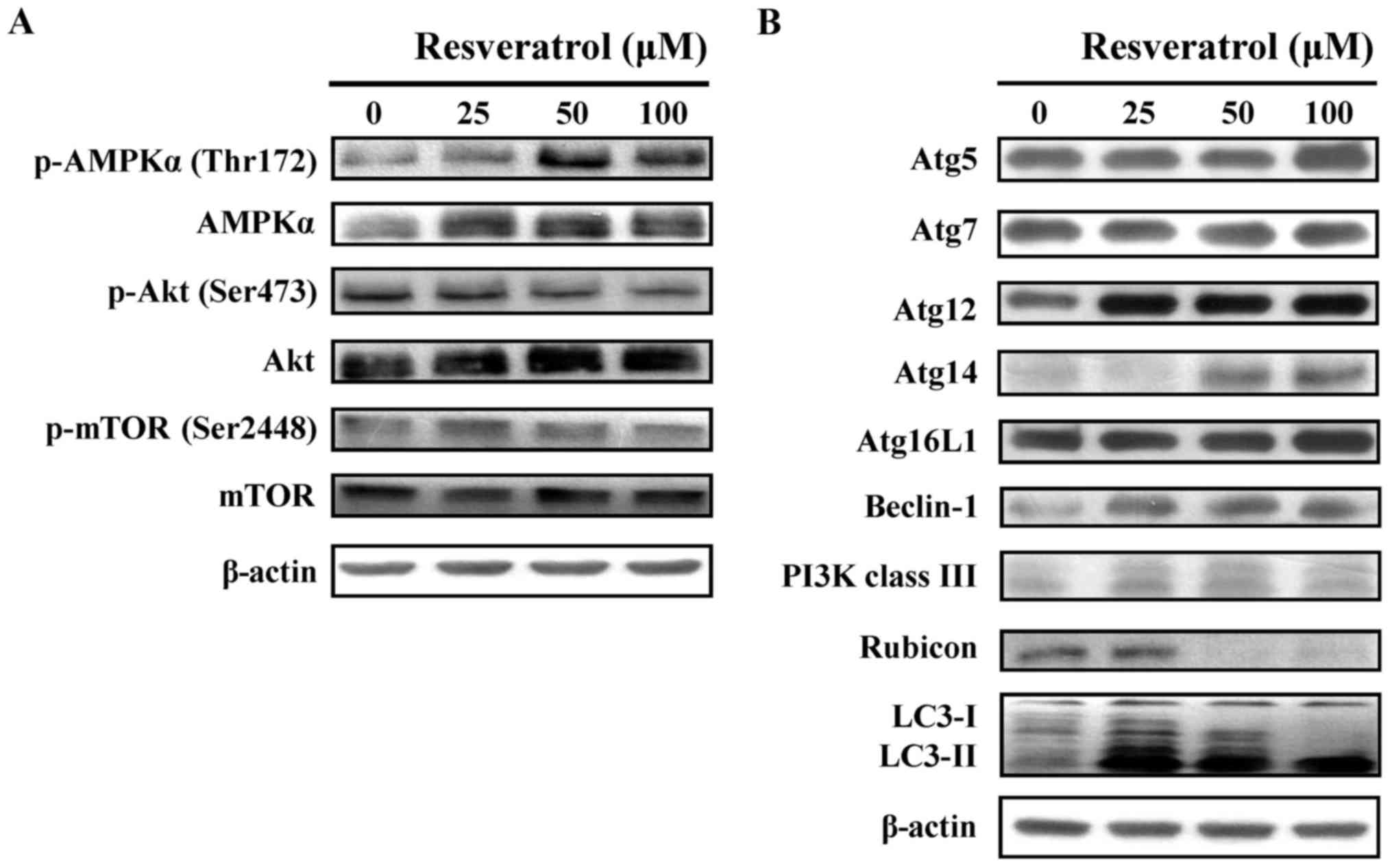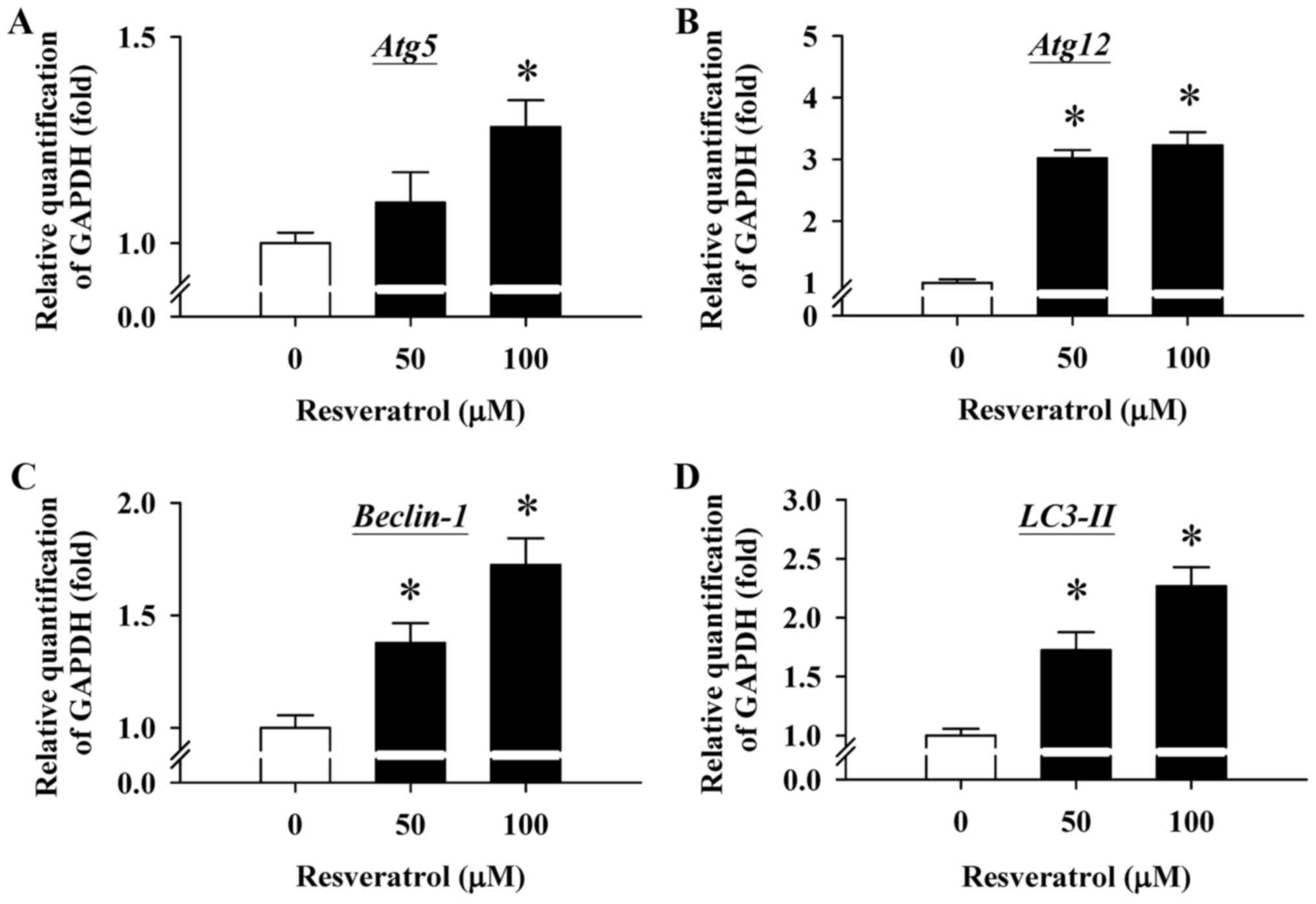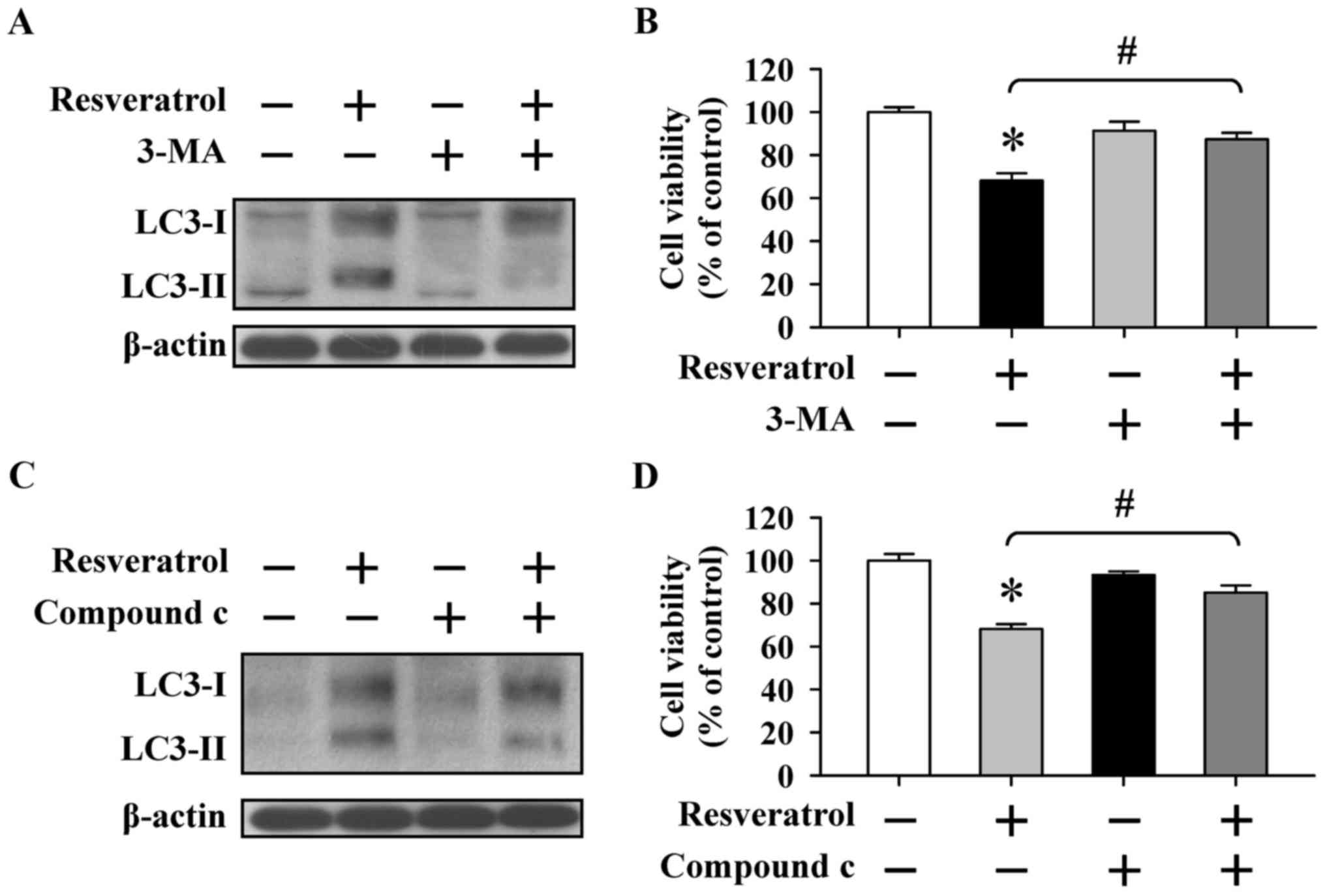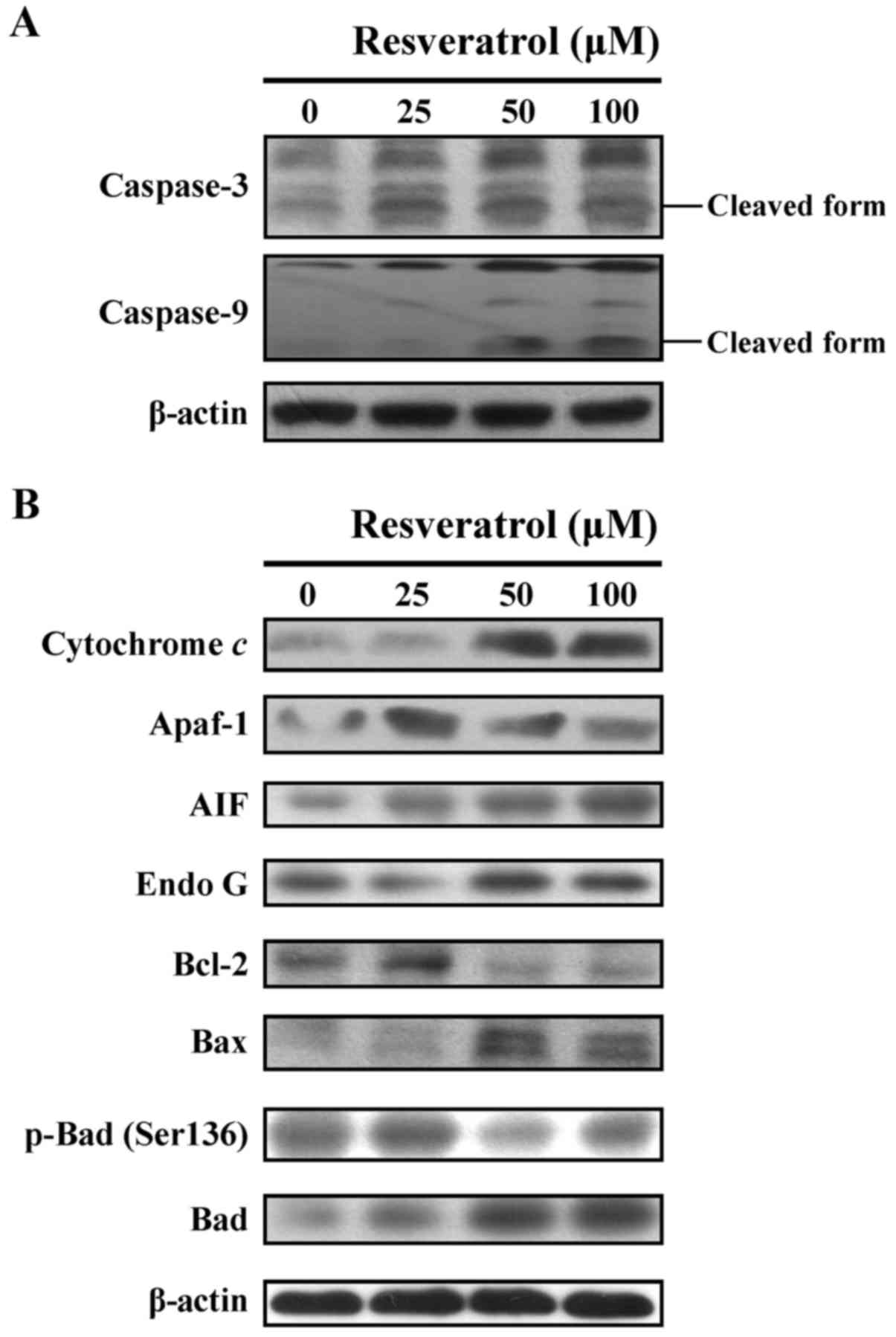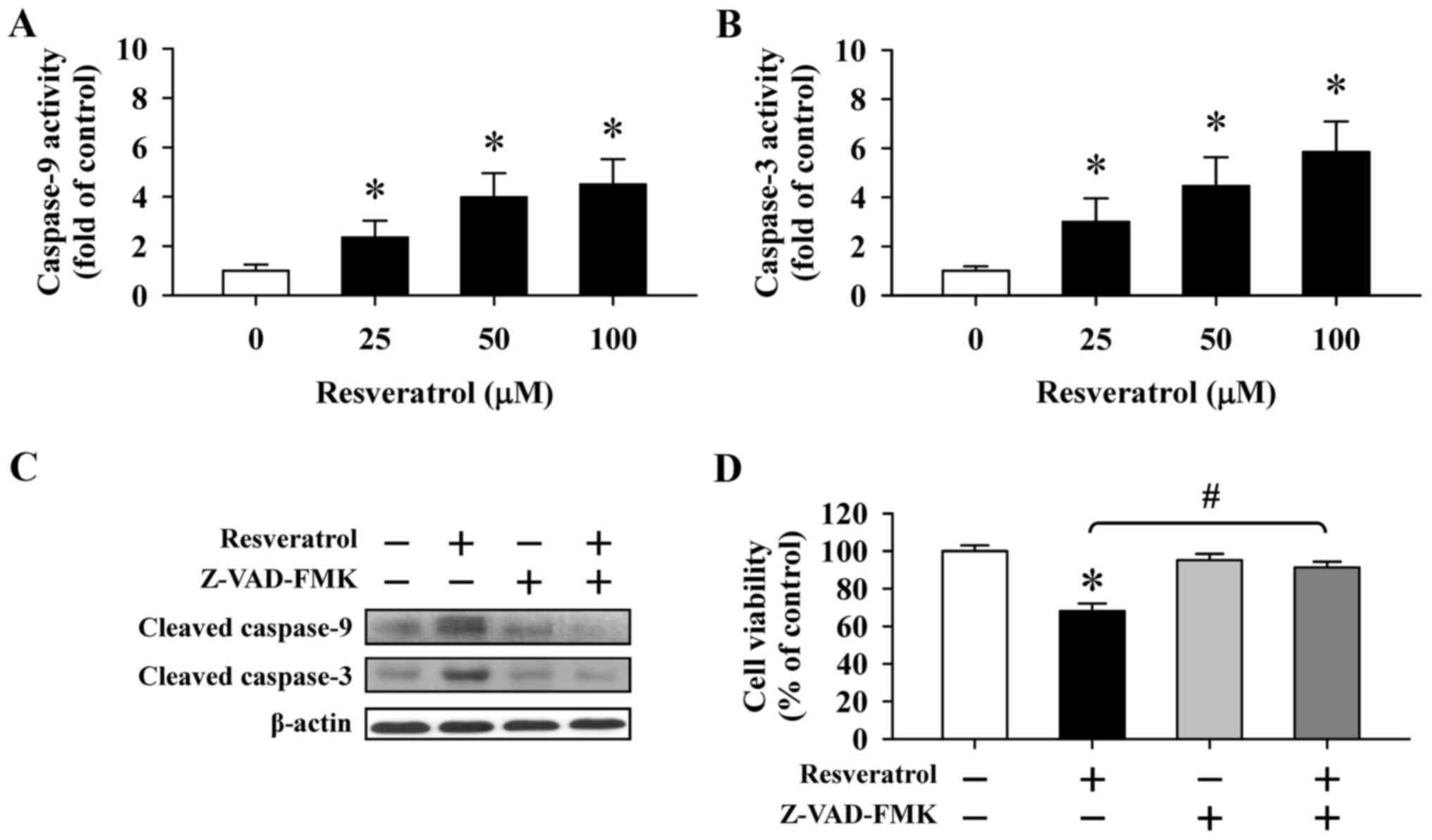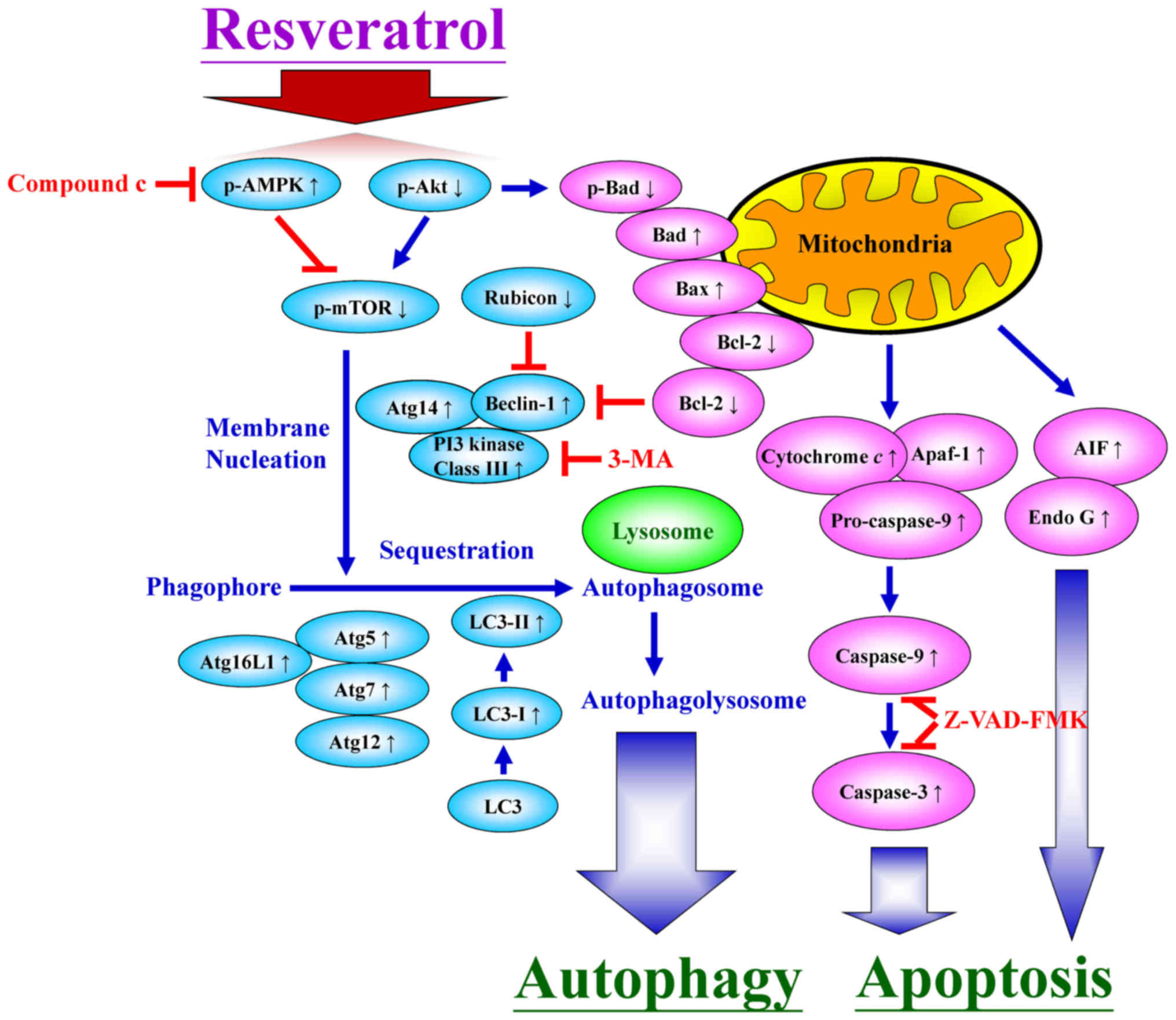|
1
|
Inoue H and Tani K: Multimodal immunogenic
cancer cell death as a consequence of anticancer cytotoxic
treatments. Cell Death Differ. 21:39–49. 2014. View Article : Google Scholar
|
|
2
|
Plati J, Bucur O and Khosravi-Far R:
Apoptotic cell signaling in cancer progression and therapy. Integr
Biol. 3:279–296. 2011. View Article : Google Scholar
|
|
3
|
Shen HM and Codogno P: Autophagic cell
death: Loch Ness monster or endangered species? Autophagy.
7:457–465. 2011. View Article : Google Scholar
|
|
4
|
Shimizu S, Yoshida T, Tsujioka M and
Arakawa S: Autophagic cell death and cancer. Int J Mol Sci.
15:3145–3153. 2014. View Article : Google Scholar : PubMed/NCBI
|
|
5
|
Pereira DL, Dos Santos Ferreira AC, de
Faria GP and Kwee JK: Autophagy interplays with apoptosis and cell
cycle regulation in the growth inhibiting effect of Trisenox in
HEP-2, a laryngeal squamous cancer. Pathol Oncol Res. 21:103–111.
2015. View Article : Google Scholar
|
|
6
|
Huang WW, Chiu YJ, Fan MJ, Lu HF, Yeh HF,
Li KH, Chen PY, Chung JG and Yang JS: Kaempferol induced apoptosis
via endoplasmic reticulum stress and mitochondria-dependent pathway
in human osteosarcoma U-2 OS cells. Mol Nutr Food Res.
54:1585–1595. 2010. View Article : Google Scholar : PubMed/NCBI
|
|
7
|
Xiong S, Mu T, Wang G and Jiang X:
Mitochondria-mediated apoptosis in mammals. Protein Cell.
5:737–749. 2014. View Article : Google Scholar : PubMed/NCBI
|
|
8
|
Yeh CC, Ko HH, Hsieh YP, Wu KJ, Kuo MY and
Deng YT: Phenethyl isothiocyanate enhances TRAIL-induced apoptosis
in oral cancer cells and xenografts. Clin Oral Investig.
20:2343–2352. 2016. View Article : Google Scholar : PubMed/NCBI
|
|
9
|
Ho TF and Chang CC: A promising 'TRAIL' of
tanshinones for cancer therapy. Biomedicine (Taipei). 5:232015.
View Article : Google Scholar
|
|
10
|
Kong B, Tsuyoshi H, Orisaka M, Shieh DB,
Yoshida Y and Tsang BK: Mitochondrial dynamics regulating
chemoresistance in gynecological cancers. Ann NY Acad Sci.
1350:1–16. 2015. View Article : Google Scholar : PubMed/NCBI
|
|
11
|
Fu Y, Chang H, Peng X, Bai Q, Yi L, Zhou
Y, Zhu J and Mi M: Resveratrol inhibits breast cancer stem-like
cells and induces autophagy via suppressing Wnt/β-catenin signaling
pathway. PLoS One. 9:e1025352014. View Article : Google Scholar
|
|
12
|
Baehrecke EH: Autophagy: Dual roles in
life and death? Nat Rev Mol Cell Biol. 6:505–510. 2005. View Article : Google Scholar : PubMed/NCBI
|
|
13
|
Hsieh MT, Chen HP, Lu CC, Chiang JH, Wu
TS, Kuo DH, Huang LJ, Kuo SC and Yang JS: The novel pterostilbene
derivative ANK-199 induces autophagic cell death through regulating
PI3 kinase class III/beclin 1/Atg-related proteins in
cisplatin-resistant CAR human oral cancer cells. Int J Oncol.
45:782–794. 2014.PubMed/NCBI
|
|
14
|
Adhauliya N, Kalappanavar AN, Ali IM and
Annigeri RG: Autophagy: A boon or bane in oral cancer. Oral Oncol.
61:120–126. 2016. View Article : Google Scholar : PubMed/NCBI
|
|
15
|
Sui X, Chen R, Wang Z, Huang Z, Kong N,
Zhang M, Han W, Lou F, Yang J, Zhang Q, et al: Autophagy and
chemotherapy resistance: A promising therapeutic target for cancer
treatment. Cell Death Dis. 4:e8382013. View Article : Google Scholar : PubMed/NCBI
|
|
16
|
Varoni EM, Lo Faro AF, Sharifi-Rad J and
Iriti M: Anticancer molecular mechanisms of resveratrol. Front
Nutr. 3:82016. View Article : Google Scholar : PubMed/NCBI
|
|
17
|
de Oliveira MR, Nabavi SF, Manayi A,
Daglia M, Hajheydari Z and Nabavi SM: Resveratrol and the
mitochondria: From triggering the intrinsic apoptotic pathway to
inducing mitochondrial biogenesis, a mechanistic view. Biochim
Biophys Acta. 1860:727–745. 2016. View Article : Google Scholar : PubMed/NCBI
|
|
18
|
Marques FZ, Markus MA and Morris BJ:
Resveratrol: Cellular actions of a potent natural chemical that
confers a diversity of health benefits. Int J Biochem Cell Biol.
41:2125–2128. 2009. View Article : Google Scholar : PubMed/NCBI
|
|
19
|
Gehm BD, McAndrews JM, Chien PY and
Jameson JL: Resveratrol, a polyphenolic compound found in grapes
and wine, is an agonist for the estrogen receptor. Proc Natl Acad
Sci USA. 94:14138–14143. 1997. View Article : Google Scholar
|
|
20
|
Dandawate PR, Subramaniam D, Jensen RA and
Anant S: Targeting cancer stem cells and signaling pathways by
phytochemicals: Novel approach for breast cancer therapy. Semin
Cancer Biol. 40–41:192–208. 2016. View Article : Google Scholar : PubMed/NCBI
|
|
21
|
Jang M, Cai L, Udeani GO, Slowing KV,
Thomas CF, Beecher CW, Fong HH, Farnsworth NR, Kinghorn AD, Mehta
RG, et al: Cancer chemopreventive activity of resveratrol, a
natural product derived from grapes. Science. 275:218–220. 1997.
View Article : Google Scholar : PubMed/NCBI
|
|
22
|
Subramanian L, Youssef S, Bhattacharya S,
Kenealey J, Polans AS and van Ginkel PR: Resveratrol: challenges in
translation to the clinic - a critical discussion. Clin Cancer Res.
16:5942–5948. 2010. View Article : Google Scholar : PubMed/NCBI
|
|
23
|
Soleas GJ, Diamandis EP and Goldberg DM:
Resveratrol: A molecule whose time has come? And gone? Clin
Biochem. 30:91–113. 1997. View Article : Google Scholar : PubMed/NCBI
|
|
24
|
Gosepath EM, Eckstein N, Hamacher A,
Servan K, von Jonquieres G, Lage H, Györffy B, Royer HD and Kassack
MU: Acquired cisplatin resistance in the head-neck cancer cell line
Cal27 is associated with decreased DKK1 expression and can
partially be reversed by overexpression of DKK1. Int J Cancer.
123:2013–2019. 2008. View Article : Google Scholar : PubMed/NCBI
|
|
25
|
Chang PY, Peng SF, Lee CY, Lu CC, Tsai SC,
Shieh TM, Wu TS, Tu MG, Chen MY and Yang JS: Curcumin-loaded
nanoparticles induce apoptotic cell death through regulation of the
function of MDR1 and reactive oxygen species in cisplatin-resistant
CAR human oral cancer cells. Int J Oncol. 43:1141–1150.
2013.PubMed/NCBI
|
|
26
|
Shih YH, Lin DJ, Chang KW, Hsia SM, Ko SY,
Lee SY, Hsue SS, Wang TH, Chen YL and Shieh TM: Evaluation physical
characteristics and comparison antimicrobial and anti-inflammation
potentials of dental root canal sealers containing hinokitiol in
vitro. PLoS One. 9:e949412014. View Article : Google Scholar : PubMed/NCBI
|
|
27
|
Lu CC, Huang BR, Liao PJ and Yen GC:
Ursolic acid triggers nonprogrammed death (necrosis) in human
glioblastoma multiforme DBTRG-05MG cells through MPT pore opening
and ATP decline. Mol Nutr Food Res. 58:2146–2156. 2014. View Article : Google Scholar : PubMed/NCBI
|
|
28
|
Ma YS, Weng SW, Lin MW, Lu CC, Chiang JH,
Yang JS, Lai KC, Lin JP, Tang NY, Lin JG, et al: Antitumor effects
of emodin on LS1034 human colon cancer cells in vitro and in vivo:
Roles of apoptotic cell death and LS1034 tumor xenografts model.
Food Chem Toxicol. 50:1271–1278. 2012. View Article : Google Scholar : PubMed/NCBI
|
|
29
|
Chiang JH, Yang JS, Lu CC, Hour MJ, Chang
SJ, Lee TH and Chung JG: Newly synthesized quinazolinone HMJ-38
suppresses angiogenetic responses and triggers human umbilical vein
endothelial cell apoptosis through p53-modulated Fas/death receptor
signaling. Toxicol Appl Pharmacol. 269:150–162. 2013. View Article : Google Scholar : PubMed/NCBI
|
|
30
|
Yuan CH, Horng CT, Lee CF, Chiang NN, Tsai
FJ, Lu CC, Chiang JH, Hsu YM, Yang JS and Chen FA: Epigallocatechin
gallate sensitizes cisplatin-resistant oral cancer CAR cell
apoptosis and autophagy through stimulating AKT/STAT3 pathway and
suppressing multidrug resistance 1 signaling. Environ Toxicol. May
20–2016.Epub ahead of print.
|
|
31
|
Lai KC, Huang AC, Hsu SC, Kuo CL, Yang JS,
Wu SH and Chung JG: Benzyl isothiocyanate (BITC) inhibits migration
and invasion of human colon cancer HT29 cells by inhibiting matrix
metalloproteinase-2/-9 and urokinase plasminogen (uPA) through PKC
and MAPK signaling pathway. J Agric Food Chem. 58:2935–2942. 2010.
View Article : Google Scholar : PubMed/NCBI
|
|
32
|
Lu CC, Yang JS, Chiang JH, Hour MJ, Lin
KL, Lee TH and Chung JG: Cell death caused by quinazolinone HMJ-38
challenge in oral carcinoma CAL 27 cells: Dissections of
endoplasmic reticulum stress, mitochondrial dysfunction and tumor
xenografts. Biochim Biophys Acta. 1840:2310–2320. 2014. View Article : Google Scholar : PubMed/NCBI
|
|
33
|
Gwak H, Kim S, Dhanasekaran DN and Song
YS: Resveratrol triggers ER stress-mediated apoptosis by disrupting
N-linked glycosylation of proteins in ovarian cancer cells. Cancer
Lett. 371:347–353. 2016. View Article : Google Scholar
|
|
34
|
Lang F, Qin Z, Li F, Zhang H, Fang Z and
Hao E: Apoptotic cell death induced by resveratrol is partially
mediated by the autophagy pathway in human ovarian cancer cells.
PLoS One. 10:e01291962015. View Article : Google Scholar : PubMed/NCBI
|
|
35
|
Yuan SX, Wang DX, Wu QX, Ren CM, Li Y,
Chen QZ, Zeng YH, Shao Y, Yang JQ, Bai Y, et al: BMP9/p38 MAPK is
essential for the antiproliferative effect of resveratrol on human
colon cancer. Oncol Rep. 35:939–947. 2016.
|
|
36
|
Crek C, Mutlu Altundag E, Karademir B,
Kocturk S, Kartal Ozer N and Taga Y: The effect of resveratrol on
signal transduction pathways and the role of pro-apoptotic Bax
protein on apoptosis in HCT-116 colon carcinoma cell lines. Free
Radic Biol Med. 75(Suppl 1): S272014. View Article : Google Scholar
|
|
37
|
Zhu Y, He W, Gao X, Li B, Mei C, Xu R and
Chen H: Resveratrol overcomes gefitinib resistance by increasing
the intracellular gefitinib concentration and triggering apoptosis,
autophagy and senescence in PC9/G NSCLC cells. Sci Rep.
5:177302015. View Article : Google Scholar : PubMed/NCBI
|
|
38
|
Selvaraj S, Sun Y, Sukumaran P and Singh
BB: Resveratrol activates autophagic cell death in prostate cancer
cells via down-regulation of STIM1 and the mTOR pathway. Mol
Carcinog. 55:818–831. 2016. View Article : Google Scholar
|
|
39
|
Alayev A, Berger SM, Kramer MY, Schwartz
NS and Holz MK: The combination of rapamycin and resveratrol blocks
autophagy and induces apoptosis in breast cancer cells. J Cell
Biochem. 116:450–457. 2015. View Article : Google Scholar :
|
|
40
|
Lin X, Wu G, Huo WQ, Zhang Y and Jin FS:
Resveratrol induces apoptosis associated with mitochondrial
dysfunction in bladder carcinoma cells. Int J Urol. 19:757–764.
2012. View Article : Google Scholar : PubMed/NCBI
|
|
41
|
Trincheri NF, Follo C, Nicotra G,
Peracchio C, Castino R and Isidoro C: Resveratrol-induced apoptosis
depends on the lipid kinase activity of Vps34 and on the formation
of autophagolysosomes. Carcinogenesis. 29:381–389. 2008. View Article : Google Scholar
|
|
42
|
Button RW, Vincent JH, Strang CJ and Luo
S: Dual PI-3 kinase/mTOR inhibition impairs autophagy flux and
induces cell death independent of apoptosis and necroptosis.
Oncotarget. 7:5157–5175. 2016.PubMed/NCBI
|
|
43
|
Elmore S: Apoptosis: A review of
programmed cell death. Toxicol Pathol. 35:495–516. 2007. View Article : Google Scholar : PubMed/NCBI
|
|
44
|
García-Zepeda SP, García-Villa E,
Díaz-Chávez J, Hernández-Pando R and Gariglio P: Resveratrol
induces cell death in cervical cancer cells through apoptosis and
autophagy. Eur J Cancer Prev. 22:577–584. 2013. View Article : Google Scholar : PubMed/NCBI
|
|
45
|
Miki H, Uehara N, Kimura A, Sasaki T, Yuri
T, Yoshizawa K and Tsubura A: Resveratrol induces apoptosis via
ROS-triggered autophagy in human colon cancer cells. Int J Oncol.
40:1020–1028. 2012.PubMed/NCBI
|
|
46
|
Mancias JD and Kimmelman AC: Targeting
autophagy addiction in cancer. Oncotarget. 2:1302–1306. 2011.
View Article : Google Scholar : PubMed/NCBI
|
|
47
|
He C and Klionsky DJ: Regulation
mechanisms and signaling pathways of autophagy. Annu Rev Genet.
43:67–93. 2009. View Article : Google Scholar : PubMed/NCBI
|
|
48
|
Zhao YY, Tian Y, Zhang J, Xu F, Yang YP,
Huang Y, Zhao HY, Zhang JW, Xue C, Lam MH, et al: Effects of an
oral allosteric AKT inhibitor (MK-2206) on human nasopharyngeal
cancer in vitro and in vivo. Drug Des Devel Ther. 8:1827–1837.
2014. View Article : Google Scholar : PubMed/NCBI
|
|
49
|
Li YC, He SM, He ZX, Li M, Yang Y, Pang
JX, Zhang X, Chow K, Zhou Q, Duan W, et al: Plumbagin induces
apoptotic and autophagic cell death through inhibition of the
PI3K/Akt/mTOR pathway in human non-small cell lung cancer cells.
Cancer Lett. 344:239–259. 2014. View Article : Google Scholar
|
|
50
|
Kim J, Kundu M, Viollet B and Guan KL:
AMPK and mTOR regulate autophagy through direct phosphorylation of
Ulk1. Nat Cell Biol. 13:132–141. 2011. View Article : Google Scholar : PubMed/NCBI
|
|
51
|
Zhu LQ, Zhen YF, Zhang Y, Guo ZX, Dai J
and Wang XD: Salinomycin activates AMP-activated protein
kinase-dependent autophagy in cultured osteoblastoma cells: A
negative regulator against cell apoptosis. PLoS One. 8:e841752013.
View Article : Google Scholar : PubMed/NCBI
|
|
52
|
Jiang H, Liu W, Zhan SK, Pan YX, Bian LG,
Sun B, Sun QF and Pan SJ: GSK621 targets glioma cells via
activating AMP-activated protein kinase signalings. PLoS One.
11:e01610172016. View Article : Google Scholar : PubMed/NCBI
|
|
53
|
Din FV, Valanciute A, Houde VP, Zibrova D,
Green KA, Sakamoto K, Alessi DR and Dunlop MG: Aspirin inhibits
mTOR signaling, activates AMP-activated protein kinase, and induces
autophagy in colorectal cancer cells. Gastroenterology.
142:1504–1515.e3. 2012. View Article : Google Scholar : PubMed/NCBI
|
|
54
|
Liu YQ, Cheng X, Guo LX, Mao C, Chen YJ,
Liu HX, Xiao QC, Jiang S, Yao ZJ and Zhou GB: Identification of an
annonaceous acetogenin mimetic, AA005, as an AMPK activator and
autophagy inducer in colon cancer cells. PLoS One. 7:e470492012.
View Article : Google Scholar : PubMed/NCBI
|
|
55
|
Yang JS, Chen GW, Hsia TC, Ho HC, Ho CC,
Lin MW, Lin SS, Yeh RD, Ip SW, Lu HF, et al: Diallyl disulfide
induces apoptosis in human colon cancer cell line (COLO 205)
through the induction of reactive oxygen species, endoplasmic
reticulum stress, caspases casade and mitochondrial-dependent
pathways. Food Chem Toxicol. 47:171–179. 2009. View Article : Google Scholar
|















